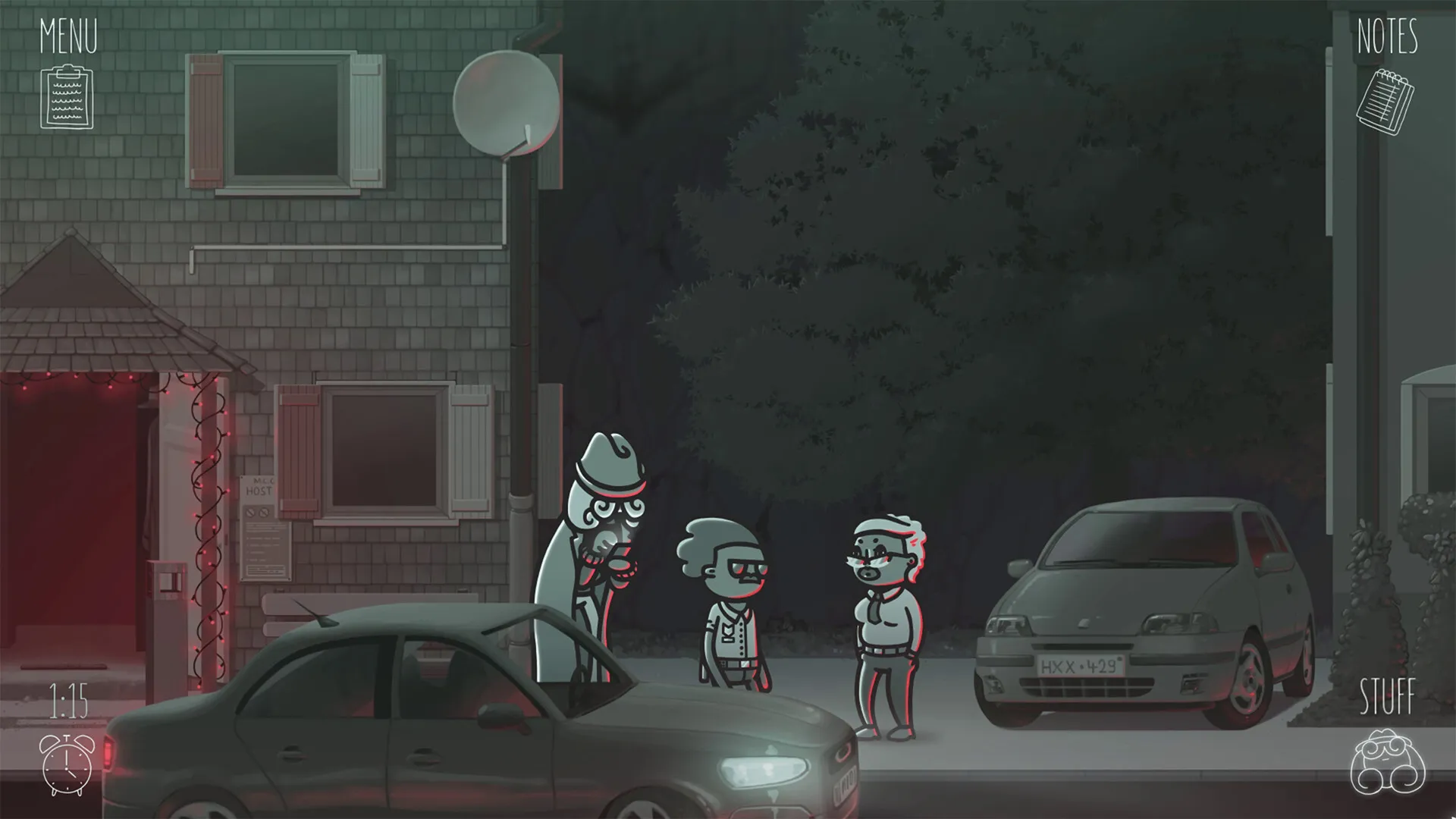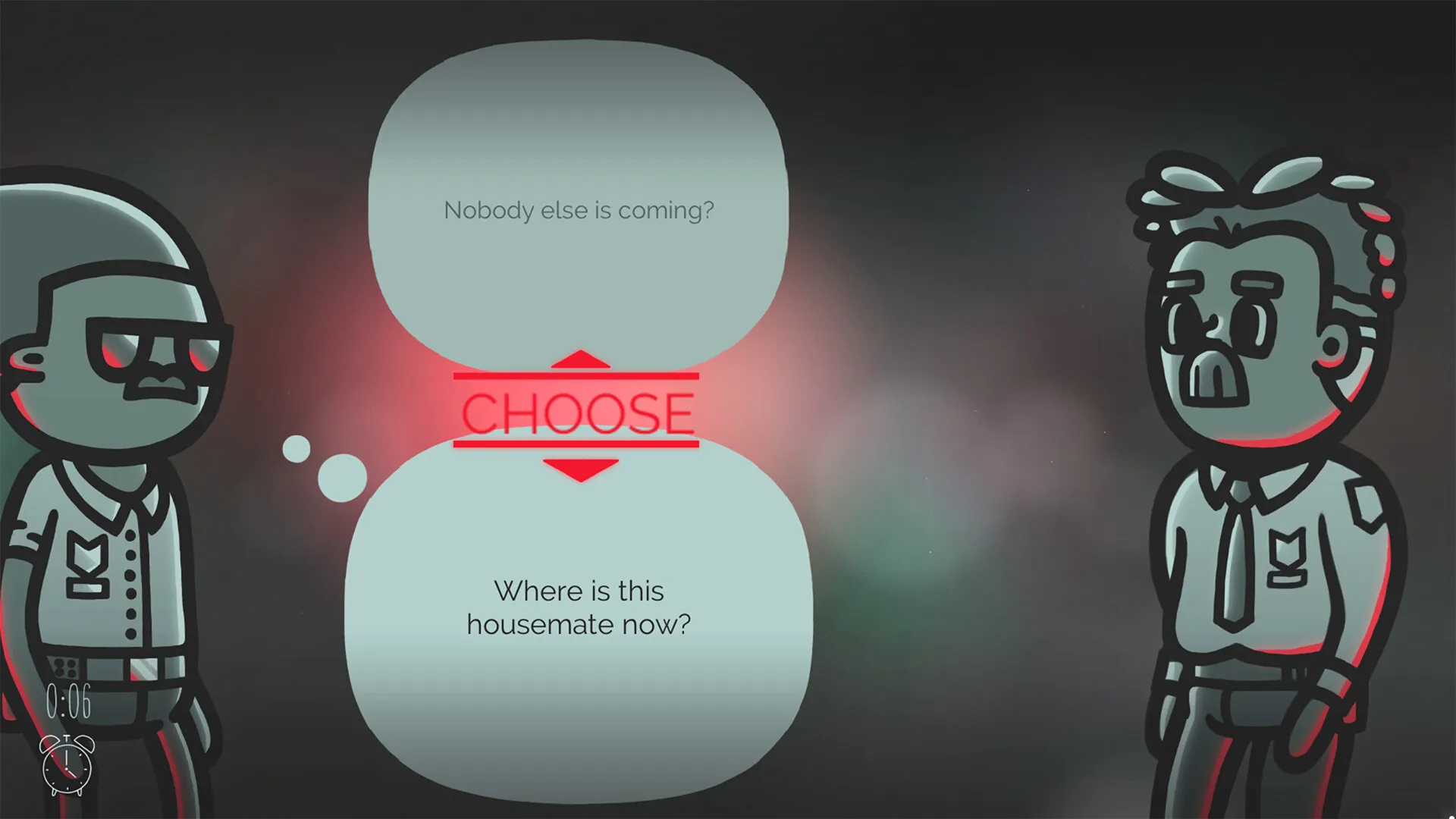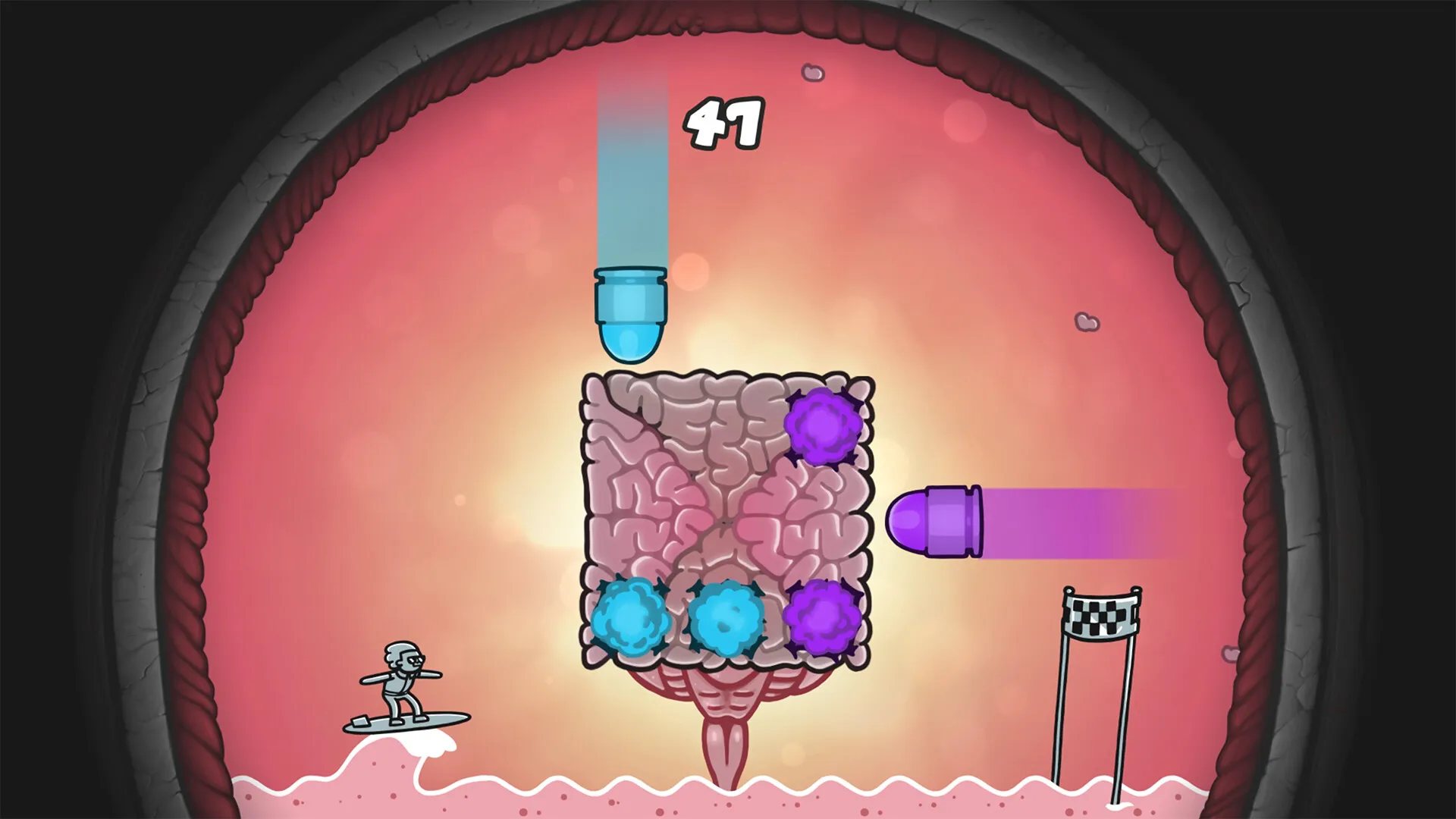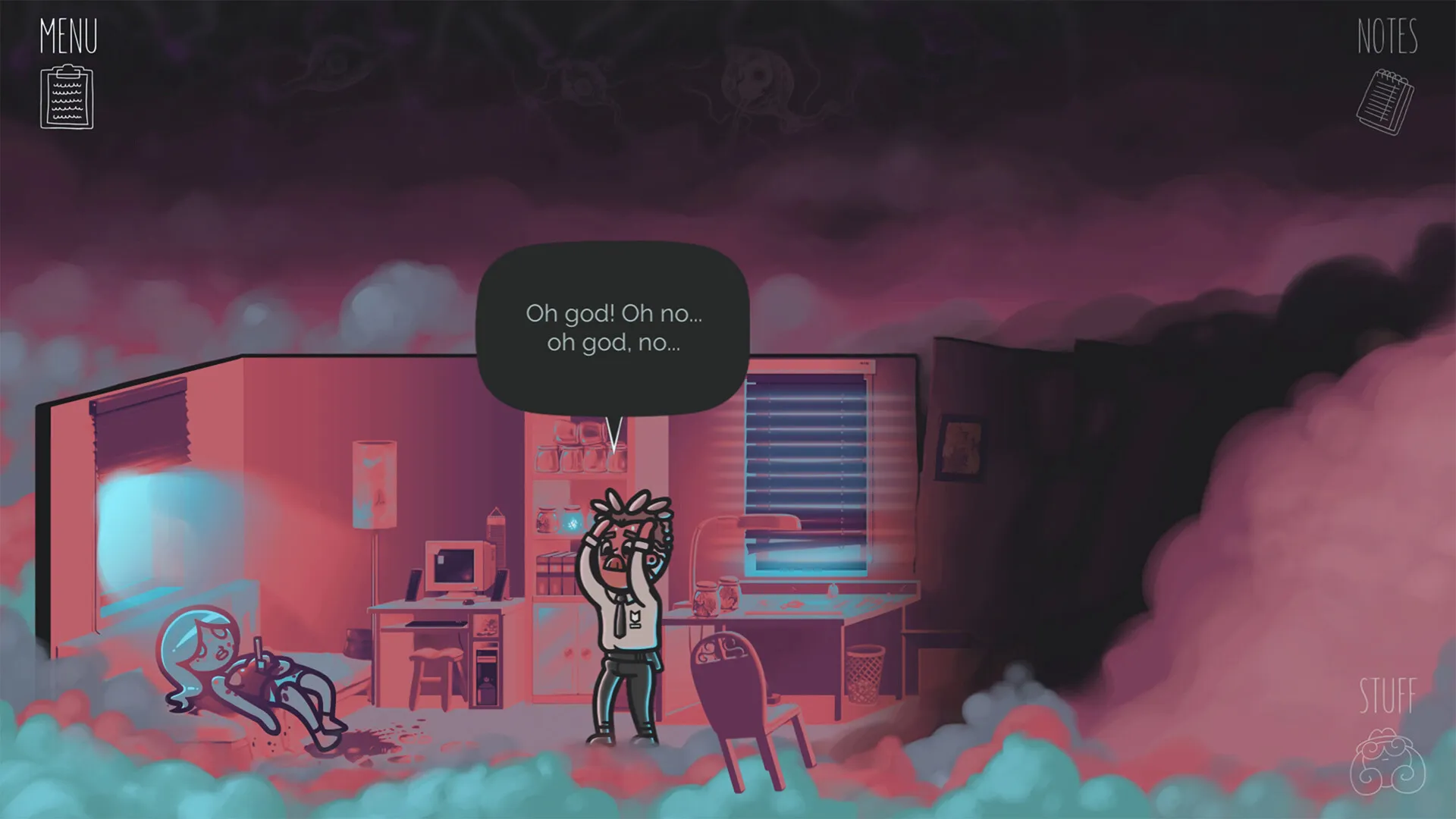Mindcop’s primary mechanics are based on standard point-and-click adventure gameplay. Still, it also includes elements that require players to think like detectives and strategists. Fans of the genre will be familiar with the game’s fundamental mechanics, which involve wandering through finely created landscapes and interacting with suspects and items.
The surprise, however, lies in its emphasis on player age without handholding. Every contact, from questioning suspects to looking through a dusty drawer, feels planned. However, this freedom is tied to a harsh time management system that turns exploration into a high-stakes balancing act.
The seven-hour in-game day mechanic is a narrative and mechanical masterstroke reflecting real-world detective work pressures. Every action takes time—even something as trivial as opening a door or picking up an object—and forces players to consider the potential worth of their decisions. This tension isn’t just a gimmick; it permeates every moment, promoting efficiency and meticulous planning.
The effect is a genuine sense of dread as the clock ticks away, especially when pursuing a lead that turns out to be a dead end. The system encourages systematic play while punishing impulsiveness, making the game as much about resource management (time) as it is about solving the mystery.
Mindcop’s integration of mechanics and stories shines most brightly during clue collection. Clues and evidence range from simple things to mysterious insights obtained via the game’s trademark “windsurfing” mechanism. This match-3 puzzle reveals parts of the suspects’ inner thoughts. These fragments, called truths, lies, and uncertainties, are frequently ambiguous or surreal, forcing players to piece together their importance within the larger narrative.
What jumps out here is how the game encourages players to make decisions based on inadequate information. You’re rarely given the “smoking gun”; instead, you’ll have to cross-reference evidence, analyze symbols, and occasionally trust your instincts. This layer of interplay between mechanics and narrative keeps the investigation engaging while encouraging players to think critically about every move.
Threads of Truth: How Mindcop Weaves Story and Choice Together
Mindcop is fundamentally a game about unearthing buried truths—not just about the murder but also the individuals affected. The fundamental mystery is a traditional whodunit: Rebecca, a resident of the remote Merrilyn Crater Camp, has been brutally killed, and it is up to the titular Mindcop and his grounded but sharp-witted sidekick, Linda, to solve the case.
The woods campgrounds provide the ideal backdrop for the game’s blend of tension and reflection. The environment feels intentionally intimate—a small, close-knit community where everyone has secrets. It’s a setting that immediately recalls Twin Peaks and Return of the Obra Dinn—a surreal small-town mystery combined with meticulous deduction—but Mindcop adds its own paranormal edge.
Every suspect you meet is beautifully rendered, both narratively and emotionally, with backstories and motivations that ripple throughout the investigation. Characters like Merrilyn Camp’s timid sheriff and the turbulent couple Olivia and Sean are more than prospective suspects; they are living, breathing beings affected by their relationships and prior traumas. The game’s windsurfing element, which lets you enter a suspect’s mind, goes beyond basic information collecting.
By exposing their “truths, lies, and uncertainties,” you are forced to confront the messy, frequently contradictory essence of the human mind. This adds an intriguing layer of moral ambiguity—knowing a character’s worst fears or witnessing a surreal metaphor for their guilt doesn’t always imply they’re the murderer, but it could imply something as unsettling.
Mindcop and Linda’s cooperation provides a firm emotional anchor amid upheaval. Their dynamic is familiar but nuanced, blending banter with genuine bonding moments. Linda’s ideas and assistance feel important, making her more than just a sidekick; she actively influences your perception of the case and its suspects. It’s a relationship evocative of games like Disco Elysium, in which a minor character serves as a counterpoint and a mirror for the protagonist’s eccentricities and weaknesses.
Mindcop’s non-linear narrative structure sets it apart. Player choices, from who you question to when you acquire a search warrant, can substantially alter the direction of the investigation. Arresting a suspect too early may cut off vital storylines, whereas chasing a false herring may waste valuable time.
The game’s branching storylines and different endings ensure that no two playthroughs feel the same, encouraging players to experiment and accept failure. Mindcop, like Obra Dinn and Disco Elysium, knows that the best puzzles are about piecing together your version of reality rather than obtaining the “right” answer.
Cracking the Mental Code: Mind-Surfing as Gameplay and Metaphor
Mind-surfing, Mindcop’s most unique mechanic, is a daring combination of puzzle gameplay and narrative exploration. At its core, it’s a match-3 minigame in which players must spin a brain-like grid to align colored Mind Bullets in rows of three or more. A time limit and disruptive “stressors” (obstacles that impede progress till removed) create a frenetic layer of tension.
The system reflects the investigation’s high-pressure stakes, forcing players to act fast and strategically, balancing urgent necessities with long-term rewards. As Mindcop’s psychic abilities evolve, players can improve these Mind Bullets to lengthen time or cope with stressors more efficiently, creating a sense of progression to an otherwise simple mechanic.
Completing a mind-surf allows access to a suspect’s subconscious, symbolized by three doors labeled Truth, Lie, and Uncertainty. Each door reveals a piece of the character’s personality, ranging from simple admissions to surreal, symbolic images. These disclosures aren’t instantly relevant; they frequently require interpretation and cross-referencing with additional facts.
For example, a true recollection may confirm an alibi. Yet, uncertainty may offer enigmatic signals that only make sense later in the investigation. This ambiguity is both a strength and a cause of irritation, as the game purposefully avoids simple answers, forcing players to think critically about what they’ve discovered.
As the investigation continues, mind-surfing gets increasingly difficult. Faster stressors and limited time frames put reflexes and strategy to the test, but the difficulty slope stays manageable. While some may find the riddles tedious, their integration into the narrative elevates them. Mind-surfing, like Disco Elysium’s talent checks or Return of the Obra Dinn’s deduction puzzles, is more than just a mechanical challenge; it’s a thematic extension of the game’s examination of truth, doubt, and the human mind.
The Clock is Ticking: Freedom and Fallout in Mindcop’s Open Investigation
Mindcop’s open-ended approach to investigation is one of its most daring design choices. From the moment the tutorial concludes, players can explore Merrilyn Crater Camp, choosing where to go, who to question, and what to prioritize. This freedom feels both empowering and intimidating. Unlike many point-and-click adventure games that direct players down a set path, Mindcop requires you to create your journey.
Every choice is dangerous, from pursuing a hunch about a suspect to sifting through a seemingly minor location. The game’s time management mechanic, which limits players to seven in-game hours per day, ensures that no choice is without consequences. Time spent pursuing a red herring is time lost forever, resulting in a constant tension that underpins every action.
The consequences of your choices are intricately intertwined into the narrative. Arresting a suspect early may seem like a victory. Still, it might alienate their allies, cutting off key leads and closing doors to valuable evidence. Similarly, obtaining a search order to investigate someone’s house may reveal crucial information. Still, it will surely dam age the relationship, making future collaboration improbable.
Because of these cascading implications, no choice is trivial, and every action feels meaningful. The game’s inability to shelter players from their decisions’ consequences reflects real-world detective work’s stakes, anchoring its surreal concept in a stark, almost algorithmic reality.
The most interesting problem in Mindcop is balancing this investigative freedom with the ever-present time limit. Do you risk losing valuable minutes by questioning a suspect who may stonewall you, or do you windsurf them, hoping to extract anything important at the expense of time spent on the game’s match-3 puzzles? The interplay of freedom and pressure forces players to constantly adjust, rethinking methods as new evidence emerges. It’s a system that encourages critical thought while accepting the inevitability of mistakes, making the investigation feel as messy and unpredictable as the suspects’ lives.
A Clash of Tones: The Aesthetic Duality of Mindcop
Mindcop thrives on contrast, and nowhere is this more obvious than its appearance. The whimsical visuals of the game, with noodle-like character designs reminiscent of Adventure Time or Gravity Falls, create a stark contrast to the bleak noir-inspired narrative. While the bright, exaggerated visuals provide fun to the heavier themes, this stylistic mismatch can occasionally contradict the tone.
Moments of spousal abuse or murder, for example, are visually filtered via a cheerful approach that may seem inappropriate for the subject matter. However, the surreal art direction—particularly in mindscapes—adds a layer of Lynchian discomfort, as dreamy imagery blurs the boundary between the absurd and frightening. The settings, ranging from the creepy Merrilyn Crater Camp to the austere black-and-white police station, anchor the narrative in a whimsical and scary world.
As a quieter but more harmonious complement, audio design works. The minimal use of voice acting, saved for critical moments, adds a surprise emotional weight, but the lack of complete voicework throughout feels like a squandered opportunity. The noir-tinged soundtrack, however, steals the show.
With its melancholy melodies and gentle crescendos, Kevin Mauser’s score effectively captures the game’s emotional highs and lows. The music that concludes each in-game day sticks with you as a sad reminder of how quickly time passes. Together, the graphics and sounds create an aesthetic that, while imperfect, emphasizes the tension between playful humor and the severity of discovering truths.
Against the Clock: The Challenge and Allure of Replayability in Mindcop
Mindcop’s tension stems from its layered complexity, reinforced by the constant time constraint. With only five in-game days—each providing seven hours of investigative time—you’re continuously racing against the clock to piece the mystery together. Every action, whether interrogating a suspect, mind-surfing their thoughts, or moving to a new location, depletes this limited resource.
This provides a strong sense of pressure, requiring players to prioritize leads and accept that some pathways will go unexplored. While this design emphasizes the high stakes of genuine detective work, it may also be frustrating, particularly for players who like in-depth research. Choosing the wrong lead or devoting time to a red herring can be painful, but it is a sharp reminder that Mindcop prioritizes speed over curiosity.
This is where the game’s replayability becomes apparent. Mindcop’s branching narrative and nonlinear investigation routes are ideal for numerous playthroughs. The first run frequently feels like a trial by fire—an attempt to grasp the suspects, locate vital evidence, and adjust to the game’s mechanics. Subsequent playthroughs provide additional insights when players approach the story with existing knowledge, revealing new paths, suspects, and results.
The game’s numerous endings, including a “bad” ending for failing to solve the mystery, enhance replayability because each run provides an opportunity to refine techniques and reveal previously unnoticed clues.
Mindcop’s rich narrative and hard mechanics provide a similar sense of discovery to fans of games like Return of the Obra Dinn or Disco Elysium. While the time management system can be harsh, it eventually acts as both a narrative and a mechanical hook, allowing each replay to delve deeper into the game’s dense network of truths and lies.
Mindcop: A Test of Wits and Willpower
Mindcop is a unique combination of mechanical intricacy and thematic ambition. It provides a detective experience that tests your reasoning skills and your ability to navigate complicated, branching narratives. Its time management system raises the stakes, compelling players to make difficult, significant choices that ripple throughout the story.
The freedom to investigate any lead is freeing. Still, it necessitates careful planning and a willingness to accept failure—a design philosophy evocative of games like Disco Elysium and Return of the Obra Dinn.
While the windsurfing mechanism provides a distinct layer of gameplay, the match-3 puzzles might become boring over time. Similarly, while the game’s cartoonish looks are delightful, they occasionally clash with the darker themes of its noir-inspired narrative. However, these minor flaws are offset by the game’s ability to immerse players in a truly engaging mystery, with the consequences of your decisions seeming palpable and satisfying.
For fans of narrative-driven indie games or anyone who enjoys piecing together intricate plots, Mindcop is a gratifying experience. Its flaws add to its allure, making it a game worth trying, failing, and repeating.
The Review
Mindcop
Mindcop is a daring and gratifying detective experience, blending open-ended investigations with a tight investigation time management system that necessitates careful planning. Its surreal windsurfing concept and rich narrative add a new twist to the whodunit genre. However, small flaws in the art style and problem repetition hold it back significantly. Fans of narrative-heavy indie games like Disco Elysium will appreciate its complexity and replayability. At the same time, its difficult design ensures that every option feels meaningful. Mindcop stands out for anyone looking for an immersive and intellectually engaging mystery.
PROS
- Deep and engaging investigation mechanics that reward critical thinking.
- Open-ended structure allows for meaningful player agency and replayability.
- Unique "mindsurfing" mechanic adds a surreal and thematic layer to clue gathering.
- Strong narrative filled with layered characters and moral ambiguity.
- Time management system heightens tension and stakes.
CONS
- Cartoonish visuals occasionally clash with darker narrative themes.
- Mindsurfing puzzles can become repetitive over time.
- Harsh time constraints may frustrate players who prefer thorough exploration.





















































